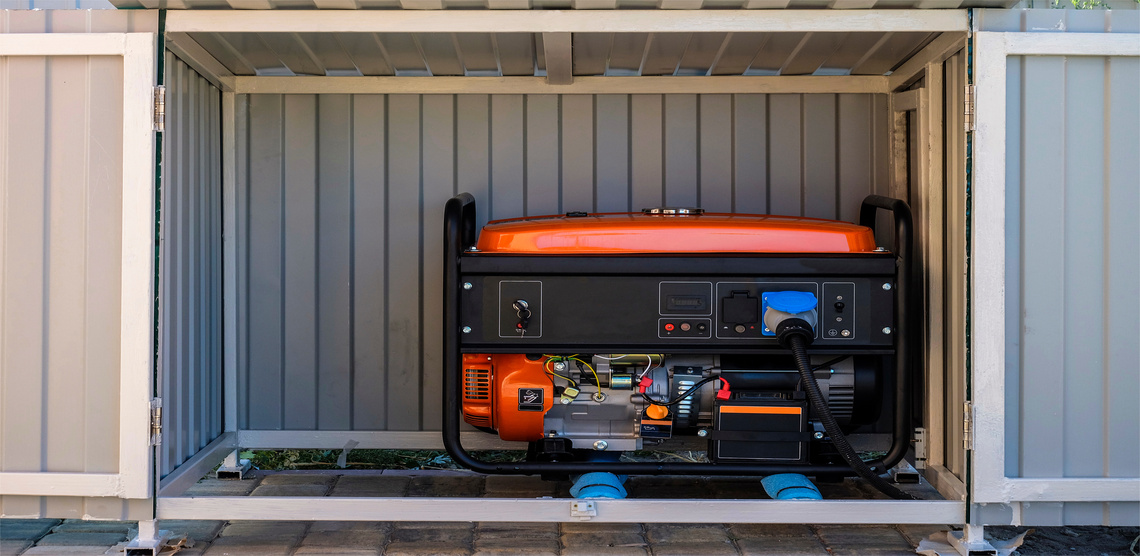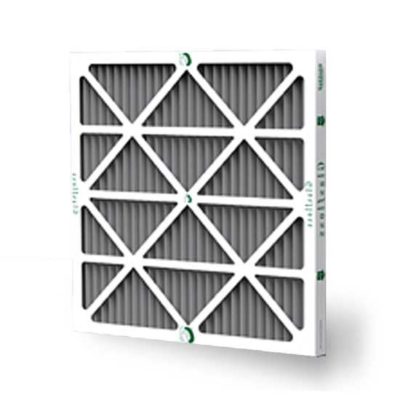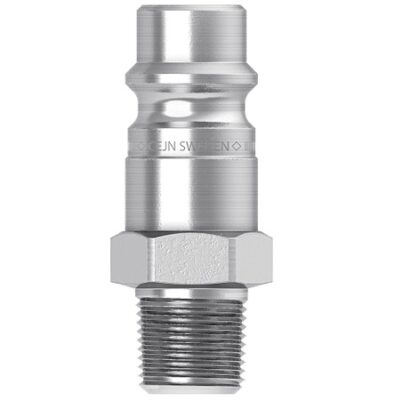Many portable generators are available to you, but which one is the best? Spoiler alert: There is not one ultimate, all-purpose generator better than the rest. However, some generators will be great solutions for your unique needs.
The application of your portable generator and how much power is needed to perform associated tasks will significantly influence your options. In addition, portable generators can be a significant monetary investment, so researching what you need is necessary.
Common Uses for Portable Generators
Generators are versatile and can be used for a variety of applications.

1. Power Outages, Natural Disasters, and Emergency Back-Up
Living without electricity can be more than just an inconvenience; it can be life-threatening! Electricity can warm your home during extreme winter weather, keep the lights on during tropical storms, and more.

2. Power Tools At Job Sites and Work Sheds
Often seen at construction sites and unpowered work sheds, generators provide power to tools when there are not any nearby sources readily available.

3. Tailgating and Other Outdoor Events
Make your outdoor celebration set-up brag-worthy and one that people talk about for years to come using a generator.

4. The Perfect Trip
Go glamping in style. Portable generators make it possible to have a home away from home, even in the middle of your campsite. In addition, they can power RVs and other equipment to make travel a breeze.
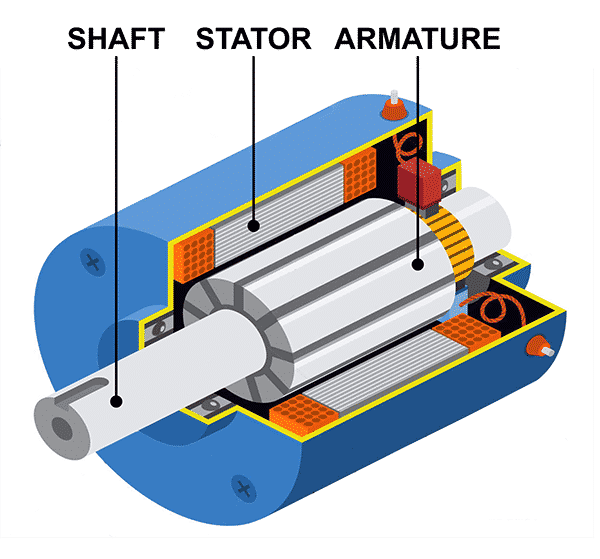
How Does a Typical Portable Generator Work?
How do these miracle machines work? Generators change mechanical energy into electricity through electromagnetic induction. Electricity generators spin copper wire, a conductor, through a magnetic field that causes an electric current to flow through them.
Power generators fueled by natural gas, gasoline, or propane run an internal combustion engine. A generator has a stationary magnetic field (stator). Inside the stator is a rotating electromagnet (armature) that spins to produce an electrical current.
The engine rotates the shaft, which turns the armature. Then, that electrical current is routed through the generator, which becomes available for you to use when you want to plug in and power your appliances.
Choosing the Best Generator For You
Whether hosting a rocking tailgating party or using secondary power as a lifeline during an emergency, you want dependable power from your generator.
Making sure you get the best portable generator begins with calculating how many watts you need.
Determining “Watts” Needed
Do you know the differences between watts, starting watts, and running watts?
- Watts: The power produced by portable generators. The more watts your generator produces, the more power you have.
- Running watts: The continuous watts needed to keep your equipment running.
- Starting watts: The extra watts required to start equipment. For example, some refrigerators need around 2,220 watts to start up but then only need 700 watts to stay on.
These three simple steps will help you calculate the size of the portable generator you need. Of course, the more appliances and equipment you will be using, the more wattage you will need.
- Choose the devices you will be running simultaneously.
- Locate the starting watts and running watts on the devices’ labels.
- Add the highest starting watts to the total running watts to determine how many watts your best portable generator.

The table below lists approximate wattages for equipment commonly used in different scenarios:
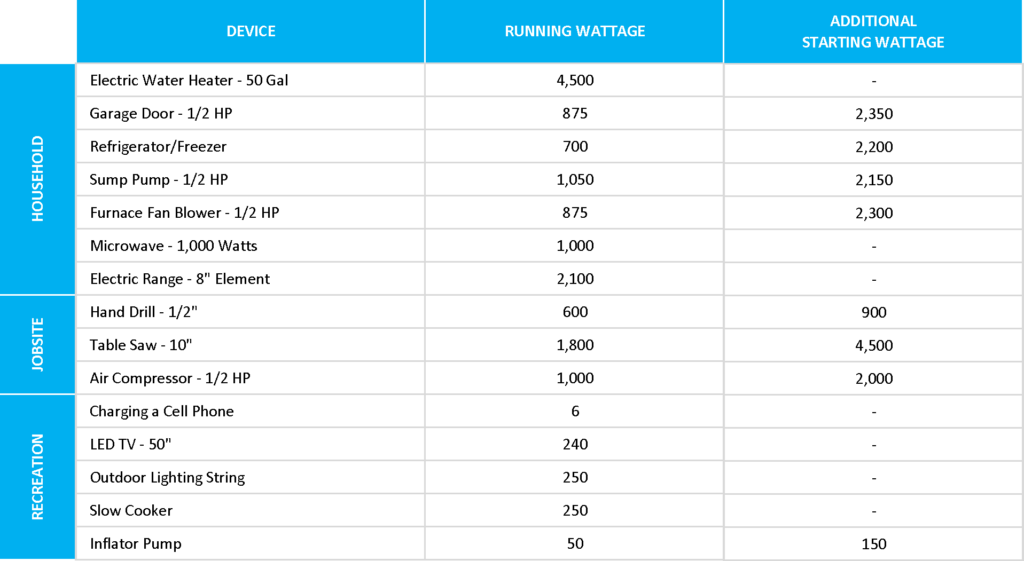
** These are just average wattages. Be sure to find the wattages listed on your equipment to do the calculations for the most accurate estimation.
Additional Considerations
Wattage is the most significant deciding factor; however, there are some additional features to consider.
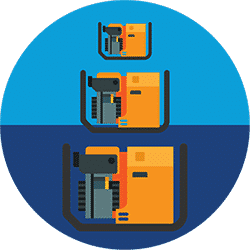
Size, Weight, Portability
Classic portable generators can vary in size drastically. While one individual can easily carry some models, other generators need a two- or four-wheel dolly for portability.
Inverter generators are smaller than classic portable generators and can fit easily in your car.

Run Times and Fuel Efficiency
Knowing how long the model will run and how much fuel it requires is vital when purchasing a generator. Some generators are designed to run for 16 hours or more, while others lose juice after only four hours. Be sure the model you choose will be able to run as needed.
Fuel Type
Portable generators can be single-fuel (can run on only one type of fuel), bi-fuel (can switch between two fuel types), or tri-fuel (can use three types of fuel).
Access and availability are the two most important attributes when choosing a fuel type. Natural Gas, Diesel, Gasoline, and Propane are the four most widely used fuels in modern electric power generators.
Natural Gas
Natural gas is readily available and does not require storage as it is supplied via a pipe system, barring any break in the supply line. While it may initially cost more than other fuel types, natural gas is also an extremely efficient fuel source and burns cleanly.
Diesel
Diesel is the least flammable compared to other available fuel types and reasonably safe to clean up if a spill occurs and almost as readily available as gasoline. Diesel can be stored for up to 24 months but does not do well in wet environments as moisture ruins it.
Gasoline
While gasoline is the most common fuel as it is readily available, when stored, it lasts 3-6 months only is highly flammable.
Propane
Propane can be stored indefinitely, is readily available even during power outages, and produces relatively low emissions. But, unfortunately, propane must be kept under pressure and is highly flammable (even explosive).

Noise
Most manufacturers will list how loud the generator is when running in decibels (dB), a measure of sound intensity and amplitude.
Here are a few examples of how loud sounds are on this scale.
- Whisper: 30 dB
- Normal conversation: 60 dB
- Vacuum cleaner: 60-75 dB
- Rock concert: 110-120 dB

Max Power Output
Many generators advertise the maximum wattage they can produce, but this full power can usually only be supplied for 30 minutes.
Be sure you look at the generator’s running power, which is the power that a generator can quickly produce for long periods. It is usually 90% of the max capacity.
Still Unsure?
If you are still uncertain which classic portable generator is suitable for your purposes, use our Portable Generator Sizing Tool to sift through Winco models and find the right one for you. Or contact one of our experts who would love to answer your lingering questions! Call us at (877) 602-0010.
Portable generators by Winco are excellent products. They make a range of generators, all with different features. Winco generators are the most popular generators on the market with both emergency power uses and construction sites in mind. One Winco generator is worth the multiple of “the other” generators. Generator failure or downtime can cost your company thousands of dollars and hours of lost productivity. Using Winco generators will save you time, money, and headaches.
ISC Sales offers a variety of Winco generators for sale. Shop available products online now. We’re your source for top-rated, high-quality generators from the Winco brand. Browse our large selection of Winco power generators and have your order shipped the same day and delivered fast, according to availability.

